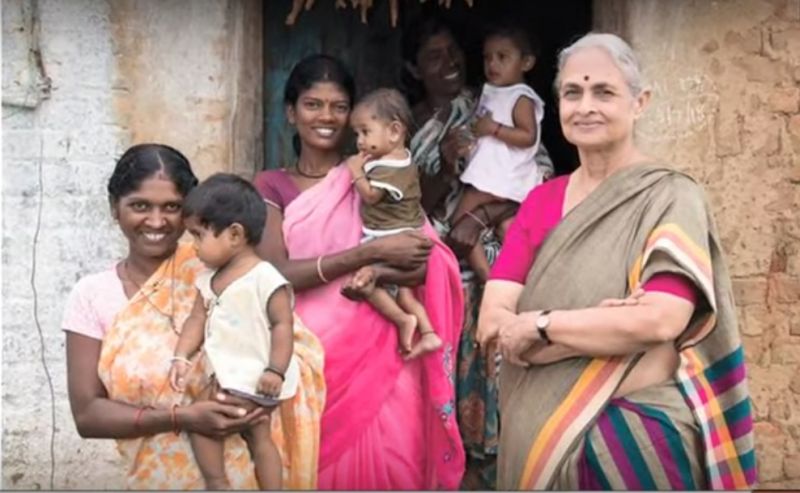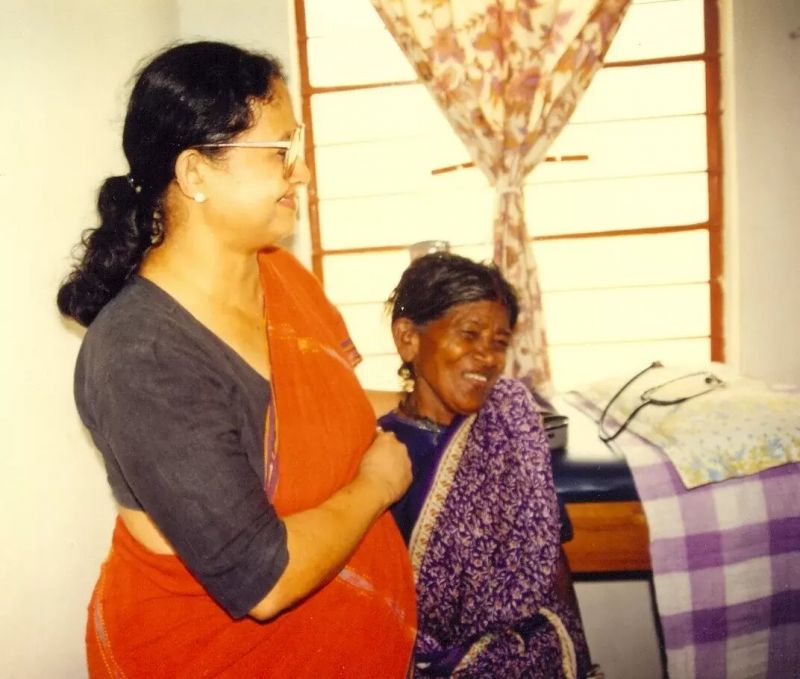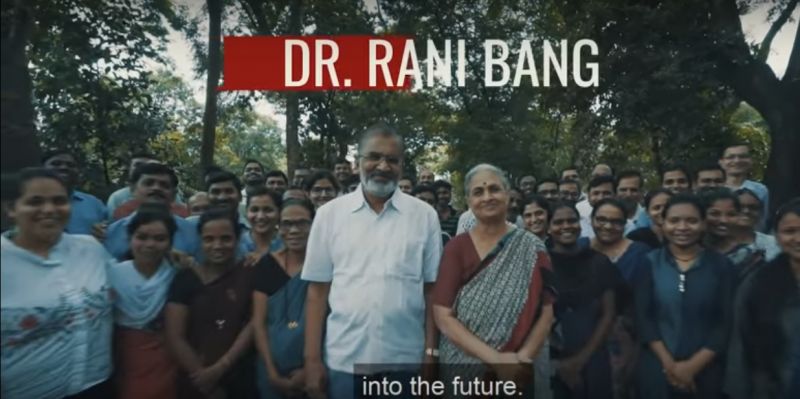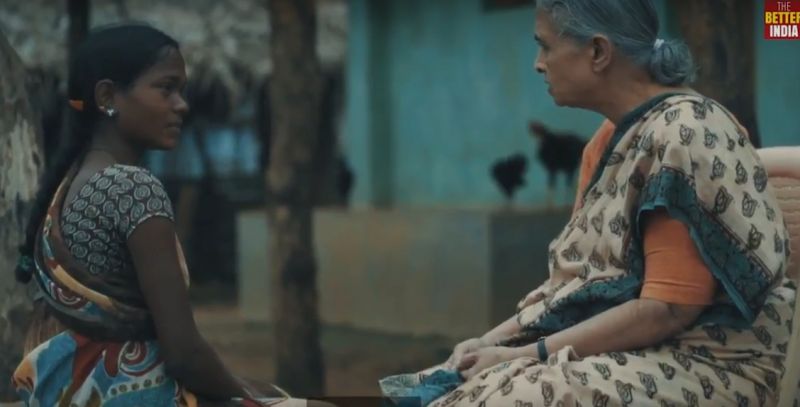Rani Bang
The Talisman of Love
 Long before Rani Bang became a doctor, she had medical and public service running through her veins that she inherited from her parents and grandparents. From the very beginning of her career, she had given herself to caring for the poorest people of rural India.
Long before Rani Bang became a doctor, she had medical and public service running through her veins that she inherited from her parents and grandparents. From the very beginning of her career, she had given herself to caring for the poorest people of rural India.
A gold medal for her MD from Nagpur University, First Distinguished Alumni Award from Johns Hopkins, Ashoka Fellow, MacArthur Foundation International Award, Padma Shri, Time magazine Global Health Heroes, and numerous national awards paint a portrait of the hand of fate or God, choicelessly shaping a person's life for its own greater purpose.
Was it really choiceless? Didn't she have to go through the confusions, temptations, challenges and struggles that inevitably shape everyone else's life?
Meeting fellow student Abhay Bang who grew up in a Gandhian family at the university might have been pre-destined. Was choosing him as a life partner, then, a given?
As young doctors in the making, organizing and leading a national group of medical professionals concerned with health-care quality and delivery could have been a youthfully idealistic project. Does that guarantee that once she finished her studies that she'd choose to move to Wardha with Dr. Abhay Bang, co-found Chetna Vikas, a non-profit, and start working with the villages of the district?
Does working in villages in the context of health-care automatically lead a person to see the complex connections between poverty, education and inequality and their impact on health? Does working in rural areas and researching on community-based health care lead to Johns Hopkins University for a Masters degree in Public Health?
 Having finished her Masters in the US, is it a no-brainer to return right back to the village and continue serving the poor?
Having finished her Masters in the US, is it a no-brainer to return right back to the village and continue serving the poor?
Dr. Rani Bang and her husband, seem to have come into possessing a magical compass: one that unfailingly pointed them to a moral, ethical and spiritual north at every critical juncture in their careers and lives.
A narrative that holds fate, God or a talisman as the reason for a person's choices, commitment and accomplishments allows people to distance themselves from "legends". And claim that such a life is possible only for a few "gifted" people. This fallacy falls apart when we look at her life not in retrospect but as it unfolded.
 When the Bangs moved to Gadchiroli, one of the poorest districts in India, they made a series of discoveries about the root causes of women and children’s health that spanned domains that include economics, culture, education, and religion. For example, they discovered as many as 18 causes for the death of a new born baby. They rigorously researched and published the causes and created international awareness around issues such as infant mortality, lack of education, doctors, facilities and resources for almost every aspect of the wellbeing of women and children. And they implemented a home and community-based approach to address those causes. The name of their grassroots organization SEARCH (Society for Education, Action & Research in Community Health) was not an aspirational one. They arrived at it after working on and integrating the knowledge and tasks associated with every word in that acronym.
When the Bangs moved to Gadchiroli, one of the poorest districts in India, they made a series of discoveries about the root causes of women and children’s health that spanned domains that include economics, culture, education, and religion. For example, they discovered as many as 18 causes for the death of a new born baby. They rigorously researched and published the causes and created international awareness around issues such as infant mortality, lack of education, doctors, facilities and resources for almost every aspect of the wellbeing of women and children. And they implemented a home and community-based approach to address those causes. The name of their grassroots organization SEARCH (Society for Education, Action & Research in Community Health) was not an aspirational one. They arrived at it after working on and integrating the knowledge and tasks associated with every word in that acronym.
The success of SEARCH is largely based on recognizing the power of working with "Dais", the Traditional Birth Attendants and training them to implement a variety of health care and educational efforts.
One paragraph from their Wikipedia page captures their work and the ripples:
A report from the Harvard University South Asia Institute states that "SEARCH is world renowned for its pioneering work in home-based neonatal care", "the landmark paper, published in The Lancet, (one of the most respected medical journals globally), changed the medical community's perception of community health workers and the power of home based care for neonates forever" and "the success of the HBNC program spawned the creation of over 800,000 "ASHA" workers through India's National Rural Health Mission." India has incorporated this model in 12th national five-year plan to reduce infant mortality. This field trial showed that newborn care can be brought out of the confines of big hospitals and high tech units and be so simplified that it can be provided in any village in any home. After this research the global newborn care has never been the same. This approach, which brought the infant mortality rate in rural Gadchiroli from 121 per 1000 live births all the way down to 30, was honoured by The Lancet in 2005 as one of the Vintage Papers. The editor and the historian of the journal considered Bang's paper on newborn care to be one of the milestone ones published in 180 years. This approach has been incorporated in the national program by the Government of India and has been accepted by the WHO, UNICEF and USAID for reducing newborn mortality in developing countries.
 Besides field research on rural health care and directly working with people to finding and implementing solutions, Dr. Rani Bang has been a leading educator through her books and speeches. Especially, she has focused on adolescents, teens and youth in the area of sexual health for many years. A report in The Lancet states, “Rani’s initiative to provide comprehensive sexual health education for the youth in the state of Maharashtra is a model for India and the rest of the world.” Recently, she has taken ‘Tarunyabhaan’, her sexual education effort online to do virtual sessions with thousands of youth across India.
Besides field research on rural health care and directly working with people to finding and implementing solutions, Dr. Rani Bang has been a leading educator through her books and speeches. Especially, she has focused on adolescents, teens and youth in the area of sexual health for many years. A report in The Lancet states, “Rani’s initiative to provide comprehensive sexual health education for the youth in the state of Maharashtra is a model for India and the rest of the world.” Recently, she has taken ‘Tarunyabhaan’, her sexual education effort online to do virtual sessions with thousands of youth across India.
No matter how gifted you are and what you inherited from your family, nothing can prepare anyone to face, sustain, and thrive in finding and implementing solutions for the poorest people in the country. It has taken Dr. Rani a sharp and determined intellect, a heart that aches with compassion and tireless hands to do justice to her inheritance and gifts.
Today, after more than three decades of service, she remains as spirited as the youth she works with. She has been a true Dai in its broadest sense and has birthed a whole legacy of heath care for women and children in India and around the world. Her legacy is still being written.
We welcome you to join this conversation with this remarkable change-maker, visionary and an inspiring community servant.
.png)
Five Questions with Rani Bang